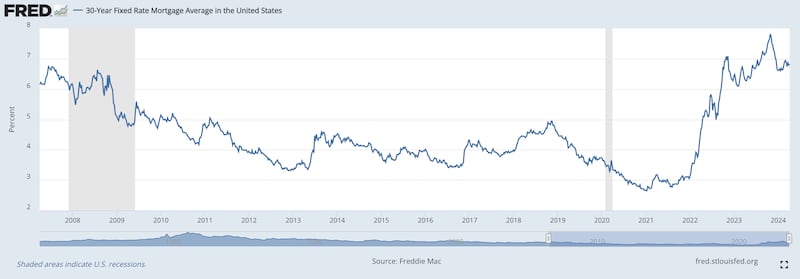With mortgage rates high, and all the bad press about Portland, you’d think that house prices would be falling.
And you’d be wrong.
The median sales price in the Portland metro area rose 1.9%, to $535,000, last month from March 2023, according to the latest report from the Regional Multiple Listing Service, a firm that tracks sales in the Northwest. RMLS doesn’t give reasons for market changes, providing just the data.
The increase comes as the interest on 30-year fixed-rate mortgages stands at 6.82%, according to the U.S. Federal Reserve Bank of St. Louis. That’s high compared with the bargain rates that prevailed during the pandemic, when rates fell below 3%, and—excluding a spike late last year—the highest level since 2007.
What’s more, Portland is no longer making headlines for livability. The New York Times, which had a crush on Portland for a decade, now chronicles the city’s drug problems and homelessness crisis.
But house prices are holding firm. That’s in part because supply remains constrained. Many homeowners are loath to move out of a house that carries a lower mortgage rate. The inventory of houses stood at 2.3 months in March. That means it would take just 2.3 months to sell all the homes available in the Portland market given the current pace of sales, making it a seller’s market. A market that favors neither buyers no sellers has closer to five months of inventory, according to most experts.
And Portland is still cheap compared with Seattle and San Francisco.
“There are plenty of people still moving here from more expensive cities,” says Suzanne Goddyn, a broker at Windermere Realty Trust. “We still look like a great value.”
There are signs that things are loosening up, supplywise. Pending sales were up 2.8% in March from a year ago. Last March, pending sales crashed 31.7% compared with March 2022.
“Business has been remarkably boisterous,” Goddyn says.
To be sure, some of that is because springtime is when houses hit the market. But one anecdotal indicator shows that homes are still coming onto the market, Goddyn says, despite the mortgage handcuffs. Her “stager,” the person she uses to temporarily decorate a house to make it more attractive to buyers, is busy until May 6.
Lenders are getting more creative, too, lowering rates in innovative ways. Some are offering free refinancing for the first year if rates come down, as many people expect them to in coming months, Goddyn says.
The one complaint Goddyn hears about Portland is the burden of the Preschool for All tax. Multnomah County residents filing singly pay the 1.5% pre-K tax on any income above $125,000. For joint filers, the threshold is $200,000.
Goddyn says she is working to sell a home in Northeast Portland for a family moving to Clackamas County, in large part to escape Multhomah County’s tax burden, which is among the highest in the country. A decline in the number of people paying the pre-K tax in 2022 compared with 2021 may indicate that other people are leaving, too, though more data will say for sure.
“The preschool tax put so many people over the edge,” Goddyn says.
So far, though, the tax hasn’t caused Portland home prices to crater.

